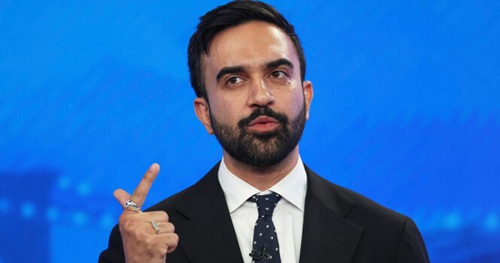Incoming NYC Mayor Zohran Mamdani Takes Aim at Trump in Bold Words
In a historic landslide that has sent shockwaves through New York City and captured national attention, voters have chosen 34-year-old Zohran Mamdani as the city’s next mayor, decisively defeating former governor Andrew Cuomo and Republican Curtis Sliwa.
With over 97% of ballots counted, Mamdani secured at least 1.03 million votes — more than all other candidates combined — signaling not only a personal victory but a profound mandate from New Yorkers.
His election marks two significant firsts in the city’s storied political history
: he is the first Muslim mayor of New York City and the first mayor of South Asian heritage, reflecting the city’s remarkable diversity and its evolution as a global hub for immigrants and their descendants.
Just a year ago, Mamdani’s name was unfamiliar to most voters. He was largely known within activist circles, grassroots organizations, and progressive political networks.
Yet, through a campaign rooted in community organizing, youth engagement, and ambitious policy proposals, Mamdani has risen from relative obscurity to claim the highest office in one of the world’s most complex and dynamic cities.
At 34, he is not only the youngest mayor New York has had in a century but also a symbol of generational change in local politics, representing a break from the traditional political establishment.
International figures immediately recognized the significance of his victory.
London Mayor Sadiq Khan hailed Mamdani’s win as a triumph of optimism over fear, tweeting, “New Yorkers faced a clear choice — between hope and fear — and just like we’ve seen in London — hope won.”
For many observers, Mamdani’s election reflects a broader trend toward progressive leadership in major global cities, emphasizing inclusivity, social equity, and policy innovation over partisan rhetoric.
At his election night rally outside the Brooklyn Paramount, Mamdani celebrated New York City’s enduring identity as a city shaped by immigrants.
“New York will remain a city of immigrants, a city built by immigrants, powered by immigrants, and as of tonight, led by an immigrant,” he declared to a cheering crowd.
The moment was a striking affirmation of the city’s diversity, underscoring the symbolic weight of his election. But Mamdani didn’t stop at celebration.
In a pointed and politically charged moment, he addressed former President Donald Trump directly, delivering four words that immediately went viral:
“Donald Trump, since I know you’re watching, I have four words for you: turn the volume up!”
Mamdani’s remarks highlight the broader national implications of his election.
Throughout his campaign, he positioned himself as a progressive counterweight to Trump’s policies, particularly on issues such as immigration, housing, and social equity.
Speaking to supporters, he emphasized New York City’s historical role in challenging political norms: “If anyone can show a nation betrayed by Donald Trump how to defeat him, it is the city that gave rise to him.
And if there is any way to terrify a despot, it is by dismantling the very conditions that allowed him to accumulate power. This is not only how we stop Trump, it’s how we stop the next one.”
The scale of the election was historic. The city’s Board of Elections reported the highest voter turnout in over fifty years, with more than two million New Yorkers casting ballots.
Participation was particularly strong among younger voters, immigrants, and communities of color, reflecting a renewed sense of civic engagement and the growing influence of progressive movements in urban politics.
Mamdani’s victory also fits into a broader wave of Democratic wins in local and state elections, energizing the party as it prepares for next year’s congressional contests.
Despite the celebratory tone of the victory, the mayor-elect faces immediate political headwinds. Former President Trump has already suggested he may attempt to withhold federal funding if a progressive like Mamdani assumes office.
In a widely covered interview on CBS’ 60 Minutes, Trump said, “If you have a communist running New York, all you’re doing is wasting the money you’re sending there.”
While Mamdani’s policies are far from communist — grounded instead in progressive populism and social equity — the statement signals that the new mayor will face scrutiny and opposition on a national scale.
Mamdani, however, remains undeterred. In his post-election remarks, he made the stakes clear: “So hear me, President Trump, when I say this: To get to any of us, you will have to go through all of us.”
Mamdani’s policy agenda is ambitious and wide-ranging. Central to his platform is housing affordability.
He has proposed a rental freeze for rent-stabilized apartments and expanded city-owned grocery stores to provide affordable fresh food in neighborhoods long underserved by traditional markets.
In transportation, he advocates for free public transit as a means to reduce the financial burden on daily commuters. Childcare is another major focus, with plans to lower costs and improve access across the city.
He has also pledged to raise the minimum wage to $30 per hour by 2030, funded by higher taxes on corporations and wealthy residents — a plan that has drawn both enthusiasm and skepticism from state lawmakers.
Public safety and quality of life are also central to Mamdani’s vision.
He has proposed the creation of a Department of Community Safety to address mental health crises without police involvement, reflecting a growing movement toward reimagining urban policing in a way that prioritizes care over enforcement.
This initiative is part of a broader strategy to tackle social inequities, strengthen local communities, and ensure that public services are responsive to residents’ needs.
Mamdani’s rise is also a story of personal and generational identity.
The son of immigrant parents, he grew up immersed in the city’s multicultural fabric and has consistently emphasized the importance of representing ordinary New Yorkers in City Hall.
He has built a reputation for authenticity, connecting with voters directly through grassroots campaigns, town halls, and social media outreach.
His rapid ascent has drawn criticism from some opponents who label him inexperienced or radical, yet his electoral margin demonstrates a clear mandate and widespread public support for a new approach to leadership.
The mayor-elect’s personal narrative resonates with a city known for embracing outsiders and innovators.
Born and raised in New York, Mamdani’s identity as a young, progressive, and immigrant-descended politician mirrors the city’s demographic evolution and its historical role as a hub for transformative social movements.
Residents and political analysts alike note that his election signals not only a generational shift but also a broader societal desire for governance that prioritizes equity, inclusivity, and systemic reform.
Looking ahead, Mamdani faces both enormous challenges and unprecedented opportunities.
Balancing ambitious progressive reforms with practical governance in one of the world’s largest, most diverse cities will require political acumen, coalition-building, and a deep understanding of New York’s complex bureaucratic and social systems.
Yet, the enthusiasm surrounding his election suggests that many New Yorkers are eager for a bold, decisive, and inclusive approach to leadership.
In short, Zohran Mamdani’s victory is both historic and symbolic. It represents a turning point in New York politics, a validation of progressive grassroots organizing, and a powerful statement about the city’s evolving identity.
As he prepares to take office, the nation — and indeed the world — will be watching to see how this young, ambitious, and historic mayor reshapes one of the planet’s most iconic cities.
At 34, Mamdani assumes office with energy, vision, and a mandate to reimagine New York City for a new era, signaling a bold chapter for the city and potentially for American politics as a whole.


